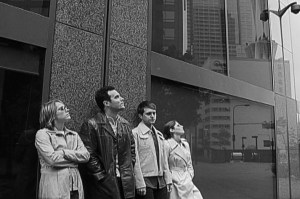Wait Means Never (Andrew Groves, 2004)
Andrew Groves’ Wait Means Never, the winner of Best Film at the 2005 Melbourne Underground Film Festival, is a timely and important film that deserves wider distribution than it has thus far received. It tells of four young extreme-left activists – Elizabeth (Rebecca Lowman), Paul (Mark Rizzo), Tom (David Haydn Jones), and Linda (Marissa Petroro) – who grow frustrated by the ineffectiveness of conventional methods of protest, and in desperation kidnap the head of an international oil company and hold him hostage. The film spends roughly equal time on the lead-up to, and the unfolding of, the kidnapping, and explores the psyche of the kidnappers as the situation deteriorates.
The film is low-key and unsensational: it doesn’t set out to dazzle, or intimidate, or sensationalise. Its importance lies in its subject matter, which is incendiary enough that a more exploitative approach would have been rife with hazard. It is, basically, a story about terrorists, and one in which the terrorists are not demonised. Instead, it manages to be calmly analytical on the subject in an age when knee-jerk hysteria seems to be precondition of media and political discussion. The characters’ actions arise from impulses that will be familiar to those on the left in the current political climate: notably, frustration at the inability to have any impact on the dominant political discourse. Enraged by the complacency of the general population, the kidnappers have allowed their desire for action and change to distort their view of what is right and wrong. It’s a convincing and compelling view of how commendable views (a desire to achieve positive reform) cross into misguided extremism. Andrew Groves, who wrote and directed, was walking a tightrope here in humanising these characters without endorsing them, and his success in doing so is the central achievement of Wait Means Never.
The central characters will be familiar to anyone who has spent any time on a university campus. They show the perils of over-education and politicisation that isn’t grounded in a moral viewpoint and a compassion for others. Their view of the world has become shaped by abstractions and academic concepts, allowing them to view other people as expendable in pursuit of an ideological cause. Importantly, though, they are neither a right-winger’s stereotyped view of the ultra-left, nor inhuman fanatics. Their conversations are dominated by ideologically driven sloganeering, and this is an aspect of the characterisation that will be off-putting to some (particularly as their slogans continue in voiceover in quiet moments throughout the film, a device that effectively conveys the ceaseless internal buzz of their dogma). However, their politics is contrasted effectively with astute observation of their personalities and everyday interaction. So central couple Tom and Elizabeth, for example, discuss power struggles and gender roles in the abstract, without facing up to the power imbalance in their own relationship. Despite the effortless patter of their political discussion, the characters are ill-equipped to deal with emotional realities: when Elizabeth tries to write a letter to her mother, she finds herself unable to move beyond her slogans and into sincere human communication.
The film was shot on digital video and is in black and white, and it’s a revealing example of how good the format can look. Grove has a really good eye for composition, and is aided by excellent cinematogrpahy by Bryan Donnell. The use of locations, in particular, is very effective, with the film capturing the anonymous, barren streets of Los Angeles very evocatively. Stylistically, the film follows in the tracks of previous politically charged, low-budget film movements such as postwar Italian film, The French New Wave of the sixties, or the New German Cinema of the seventies. These movements are the perfect inspiration for low-budget filmmakers working with digital equipment, because they crafted an aesthetic based upon immediacy and verisimilitude that is ideally suited to the new technology. The film avoids big moments of exposition or drama, making its points and drawing its characters through small gestures and actions. The pervasive sense of reality extends to the cast: Groves allowed his actors to improvise extensively, and the performances (so often the Achilles heel of low budget features) are consistently good. Of the four kidnappers, I particularly liked Mark Rizzo’s performance as the defensive and introverted Paul, which almost subliminally conveyed the struggle underneath his outward displays of bravado. Rich Williams, as their hostage, likewise lends his character (who would be unsympathetic if not for his circumstances) great dignity.
The film’s biggest problem is one it shares with its characters. The kidnappers find themselves in a situation with no way out: left with a hostage, and with the government refusing to give in to their demands, they struggle to find a way out that gives their actions some meaning. I felt Groves had painted himself into much the same corner, sharing the characters’ urge to break out of complacent acceptance of the existing political situation, but unable to express an alternative. (There is a suggestion from one character late in the film of a means of more constructive contribution to society, but the idea is quickly snuffed out). I can see the problem Groves faced – it would be difficult to resolve the film plausibly in any other way, or to make a positive point without clumsy sermonising – but it’s nevertheless a shame that the film couldn’t clearly articulate a more constructive message. However, it’s an extremely difficult conundrum – how to argue for change in a non-destructive way that doesn’t just reinforce the status quo – and it arises because of Groves’ head-on tackling of such a challenging subject. Ultimately, Wait Means Never‘s virtues far outweigh its flaws: it is a very impressive film.
This review originally appeared at In Film Australia.
